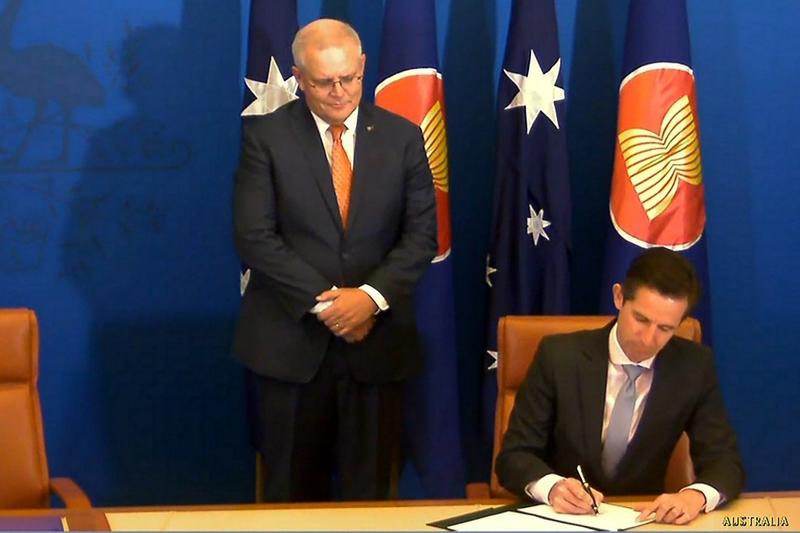 A screen grab taken from Vietnam Host Broadcaster's November 15, 2020 live video shows Australia's Prime Minister Scott Morrison (center) watching as Australia's Minister for Trade, Tourism and Investment Simon Birmingham signs the agreement during the signing ceremony for the Regional Comprehensive Economic Partnership (RCEP) trade pact at the ASEAN summit that is being held online in Hanoi. (PHOTO / AFP)
A screen grab taken from Vietnam Host Broadcaster's November 15, 2020 live video shows Australia's Prime Minister Scott Morrison (center) watching as Australia's Minister for Trade, Tourism and Investment Simon Birmingham signs the agreement during the signing ceremony for the Regional Comprehensive Economic Partnership (RCEP) trade pact at the ASEAN summit that is being held online in Hanoi. (PHOTO / AFP)
CANBERRA / MANILA / BRUSSELS / NEW YORK - Australia's trade minister has described the signing of the world's largest free trade agreement (FTA) between 15 countries as a significant commitment to "trade, openness and ambition."
"This is an incredibly important agreement in terms of the timing for when it occurs," said Australia's Minister for Trade, Tourism and Investment Simon Birmingham.
Signatories to the agreement represent nearly 30 percent of global gross domestic product (GDP) and about 30 percent of the world's population
The 15 countries, including China, Australia, Japan, South Korea, New Zealand and 10 members of the Association of South-East Asian Nations (ASEAN), on Sunday signed the Regional Comprehensive Economic Partnership (RCEP) after eight years of negotiations.
Signatories to the agreement represent nearly 30 percent of global gross domestic product (GDP) and about 30 percent of the world's population.
READ MORE: RCEP 'a driving force for global economy' in post-virus era
"This agreement signifies that our region, which has been the most economically dynamic region of the world in recent decades, is still committed to openness and to trade and that we will use that as a platform and a springboard for recovery in the post-COVID era," he said.
"Australia is a country where one in five jobs relies upon trade, and we know that better access for our farmers and businesses means more jobs for Australians overall."
Birmingham noted that Australian businesses in education, healthcare, accountancy, engineering and legal service industries would benefit the most from the deal, which will allow them to open offices throughout countries included in the deal.
Philippine Trade Secretary Ramon Lopez said Monday that the RCEP is expected to strengthen trade and investment in the region during the COVID-19 pandemic.
The trade secretary said in a statement the much long-awaited mega free trade agreement is a good signal in this time of pandemic and global uncertainties, and will be a renewed vow in a rules-based system for trade and investment.
"While countries are severely affected by the pandemic and with trade measures focused towards recovery, it is important that we remain resolved in building a wider free trade area in the region that gives stability, predictability, and confidence to investors and businesses," Lopez said.
"This RCEP is a testament that the economy should keep going," he said.
Uplifting
The China Chamber of Commerce to the European Union (CCCEU) on Sunday hailed the signing of the RCEP agreement as "uplifting" amid global recession caused by the COVID-19 pandemic.
"The conclusion of this agreement offers an uplifting example of international economic cooperation, which has been affected by protectionism and unilateralism; and it has also injected confidence to boost global economic recovery hit by the recession," said Zhou Lihong, chairwoman of the CCCEU.
"Right now, China and the EU are racing towards ending negotiation of the bilateral investment treaty (BIT) by the end of this year. We are looking forward to the conclusion of this long-awaited agreement," said Zhou, who is former chair of Bank of China Luxembourg.
RCEP will strengthen Asian-Pacific trade ties and boost the regional economy, multiple US media outlets have said.
"The RCEP aims to reduce tariffs, strengthen supply chains with common rules of origin, and codify new e-commerce rules," Bloomberg reported.
A rarity
It added that the RCEP is broad, covering many economies and goods, and the deal "is a rarity in these more protectionist times."
According to the trade pact, the RCEP will progressively phase out 90 percent of the tariffs on imports between signatories, and set up common rules for e-commerce, trade and intellectual property, which will largely boost investment, further integrate industrial and supply chains, better protect investors, and facilitate the movement of goods, funds and people across the region.
ALSO READ: RCEP nations 'plan to meet in Oct, sign deal by year-end'
The trade deal will knit those economies closer together, the Wall Street Journal (WSJ) has noted, saying it shows China's determination to further link its market with those of its neighbors, many of which already count China as their largest trading partner.
The WSJ said that at present, even countries with bilateral trade deals often impose high tariffs on finished goods such as televisions if a significant portion of the raw materials comes from a third country.
"The deal would allow companies to source raw materials from within the bloc, with their final product enjoying low or no tariff," it added.
Transformative
Deborah Elms, executive director of the Asian Trade Centre, said the RCEP is transformative, adding Asia remains open for business and has set up an institutional structure to help the region continue to lead, according to National Public Radio (NPR).
The major economies -- Japan, China and South Korea -- "never really had the big free trade agreement between each other. And this (RCEP) could be a big boost to the trade between those three," Trade economist Chad Brown at the Peterson Institute for International Economics has told NPR.


